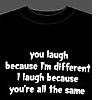Wednesday, April 7, 2010
Blog Alert - The Case For Writing Poorly, Or Using Straightforward Prose - ILBNH
Blog Alert - The Case For Writing Poorly, Or Using Straightforward Prose - ILBNH
Peta at Insert Literary Blog Name Here* acknowledges herself a literary snob. She says: "I am irritated by clunky prose, drawn out of stories by dry dialogue, and find words like “ain’t” only a few ellipses short of repulsive. I pride myself on being able to craft a good sentence. I’ve also been known to spend hours crafting that one sentence."
So it's a delicious irony that she devotes a powerful and persuasive post to the importance of connecting to a mainstream audience through a straightforward and unpretentious style.
Her motivation is at least in part commercial (a personal irony for me, as I'm non-commercially oriented - but I largely agree with her advice in any event. I think accessible writing is good writing).
In her intro she says: "Writing is a numbers game–the more books you sell, the more money you make. If you write fast, it’s even better. Getting a book out every year for ten years (Jasper Fforde’s goal), if you sell enough, could be quite lucrative (and your hourly rate might actually approach positive numbers). Yet writing, good writing, takes time to craft. Story, characters, and prose itself do not happen overnight, particularly if you’re fond of tight dialogue and polished writing. But here’s the secret: not all readers are writers, and a lot of them don’t care about your perfectly polished prose."
Me, I could care less about money numbers or books per year. But audience accessibility is important apart from all that. More readers = more impact. If I'm writing to tell a story, I want the story heard.
Peta develops a provocative case for an accessible style, along with tips.
Check it out.
-Steve
Subscribe to:
Post Comments (Atom)

3 comments:
Thanks for the linkage, Steve!
That was a surprisingly hard post to write--the more I read, the more confused I end up about all things writing. I suppose I'm really trying to get outside of my head, and see that the way I write isn't the be all and end all--playing devil's advocate to myself.
I don't particularly care about making money as an author--I mean, I/Baby/Husband need to eat, but I'm not convinced I'll ever sell a million books. I do often find myself thinking about getting stories and ideas out into the world, though--I'd like my stuff to be accessible, and I want YA folk to want to read it and to make them think in some way, no matter how small. Of course, that ultimately translates into sales, which translates into money...it's inescapable, I suppose. My husband, however, is definitely at me to go the book per year route so he can retire to one of his would-be several estates and play with one of his many would-have many iPads.
=c)
Hi Peta, and thanks for the comment back.
I think I get what you say about your own elements of confusion. Here's my thought. I think we can distinguish a couple different kinds of writing - each with their own demands and standards, but with somewhat different goals and purposes.
On the one hand there is writing whose purpose is to display technical virtuosity. The audience for this kind of writing is other writing professionals. Writers, editors, writing teachers, critics, and sophisticated readers whose enjoyment of a work is motivated by admiration for the writer's technique. (And not to forget your own "inner critic"). This I take to be your natural preferred mode of writing.
Interestingly, it's possible to be very proficient in a technical sense, and fall down on actually communicating. Take an example from a different art form. Jimi Hendrix is widely regard as one of the "greatest" guitarists of his generation, if not of all time. But what does that mean? (Fair warning - his music is not to my taste At All). When I was a young kid, my dad tried to teach me basic carpentry. We spent hours in the garage cutting 2 by 4's with an old electric circular saw. The sound of the saw biting the 2 by 4 was a lot like some of the sounds Jimi made with his guitar. On the one hand, you have to be very good to make a guitar sound like that. On the other hand, there's some question in my mind why you would want to - except to show off for other guitarists. :)
And some writing is like that. Technique - even supperb techniaue - elevated at the expense of content. (This may be the root of the oft-quoted writing advice "kill your darlings".)
Now the other mode of writing, which you champion in your post, is almost entirely about content. The reader wants to experience something entertaining, enlightening, exciting, etc. They want it to come through loud and clear. They don't want technical dazzle to get in the way. (Okay, they don't want to have to work hard to "get it"). I don't think the demands of that mode are greater or lesser than the "craftsman" mode - but they are different because the goal is different. Different mode, different skill set, still writing. Still demanding if done well.
Now I suppose the truly great writers, that are remembered for generations, are those who can do both at once. Shakespeare comes to mind. His writing is profoundly crafted - but a commoner could enjoy the plays on a straightforward level. The craftsmanship was there for the sophisticates to appreciate, but did not impede accessibility.
Well, that's off the top of my head. Hope something there resonates.
Best wishes,
-Steve
Thanks for the thoughtful post and link. Hemingway was known for his straightforward language.
Post a Comment